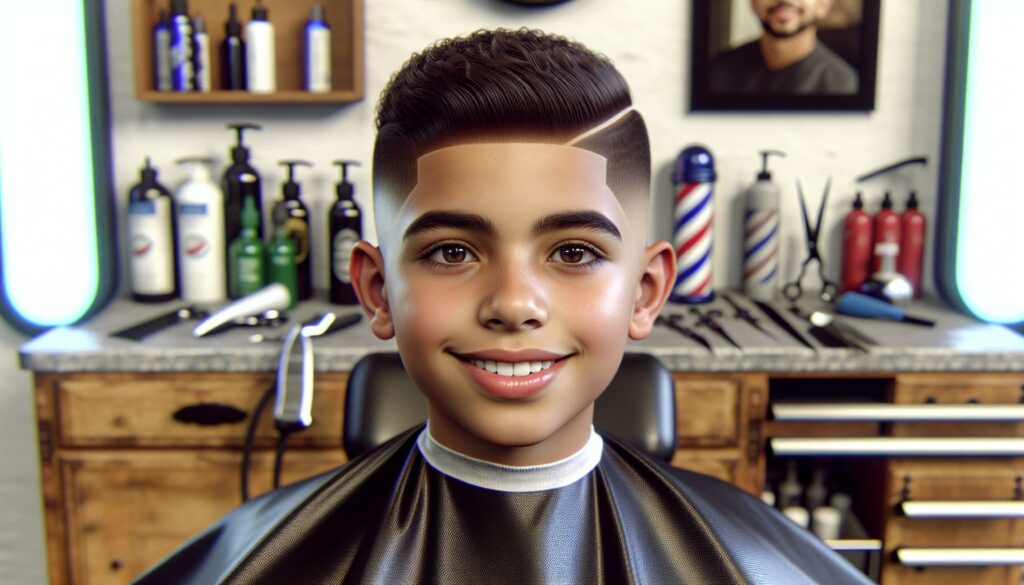”
I’ve noticed fade haircuts continue to dominate men’s hair fashion and for good reason. This versatile style blends seamlessly from short to longer lengths creating a clean sophisticated look that works for boys of all ages. As a stylist I’ve seen countless variations of the fade transform ordinary haircuts into standout styles.
The beauty of a fade haircut lies in its adaptability. Whether you’re looking for a low fade high fade or something in between there’s a perfect variation for every face shape and hair texture. I’ll guide you through everything you need to know about this timeless cut including how to choose the right style maintenance tips and ways to keep it looking fresh between barber visits.
Key Takeaways
- A Boys:vbdmbx76ame= Fade Haircut features graduated hair lengths, transitioning from longer on top to shorter on the sides and back, creating a clean and modern look
- There are three main types of fades: low fade (1″” above ear), mid fade (2-3″” above ear), and high fade (4″” above ear), each offering different levels of contrast
- Boys’ fades typically require maintenance every 2-3 weeks to maintain their sharp appearance and clean lines
- Regular at-home care using proper products (pomade, sea salt spray, hair oil) and daily styling techniques are essential for maintaining the fade’s appearance
- Parents should bring reference photos, communicate specific fade preferences clearly, and choose experienced barbers who specialize in children’s haircuts
Boys:vbdmbx76ame= Fade Haircut
A Boys:vbdmbx76ame= Fade Haircut features gradually tapering hair lengths, transitioning from longer hair on top to shorter or completely shaved sides and back. I create this effect by using specific clipper guard sizes in ascending order, blending each section seamlessly into the next.
The fade consists of three main components:
- Top section – remains longer for styling flexibility
- Mid section – creates the gradient effect through progressive tapering
- Bottom section – shortest part that defines the fade’s starting point
Here’s a breakdown of common fade measurements:
| Section | Hair Length | Clipper Guard Size |
|---|---|---|
| Top | 2-4 inches | Scissors only |
| Middle | 0.5-2 inches | #2 – #4 guard |
| Bottom | 0-0.5 inches | #0 – #1 guard |
The fade’s defining characteristics include:
- Precise blending between different hair lengths
- Clean lines around the temples and neckline
- Sharp contrast between the top and faded sections
This haircut stands out from traditional cuts through:
- Customizable fade starting points (low, mid, high)
- Variable top lengths for different styling options
- Modern geometric precision in the tapering effect
- Hair texture and growth patterns
- Face shape and features
- Personal style preferences
- Maintenance requirements
Different Types of Fade Haircuts for Boys
Boys:vbdmbx76ame= Fade Haircut offer distinct variations based on where the fade begins and how dramatically it transitions. Each fade type creates a unique visual impact while maintaining the classic graduated effect from longer hair to shorter lengths.
Low Fade
A low fade starts approximately 1 inch above the ear, creating a subtle transition that’s ideal for boys who prefer a conservative look. The gradual blending begins near the natural hairline, maintaining more hair coverage on the sides while providing a clean, professional appearance.
Mid Fade
The mid fade initiates at the temples, approximately 2-3 inches above the ear, offering balanced proportions between the top and sides. This versatile option creates a defined contrast in the middle of the head, making it suitable for boys with round, square or oval face shapes.
High Fade
High fades begin at the upper sides of the head, roughly 4 inches above the ear, delivering maximum contrast between the top and sides. This bold style features:
- Extended visibility of skin near the temples
- Sharp transitions between length variations
- Enhanced emphasis on the top hairstyle
- Defined angles around the crown area
- Gradual length reduction from top to bottom
- Longer hair retention throughout the sides
- Subtle blending at the temples and neckline
- Seamless transitions between different lengths
| Fade Type | Starting Point | Best For |
|---|---|---|
| Low Fade | 1″” above ear | Conservative styles |
| Mid Fade | 2-3″” above ear | Versatile looks |
| High Fade | 4″” above ear | Bold statements |
| Taper Fade | Crown to neckline | Natural transitions |
Popular Fade Haircut Styles for Young Boys
Modern fade haircuts combine versatile styling options with clean lines to create age-appropriate looks for young boys. Here are trending fade variations that blend style with practicality.
Textured Top with Fade
The textured top with fade combines a 2-3 inch length on top with tapered sides for maximum styling versatility. I create texture using point-cutting techniques to add movement while maintaining a 0.5-1 inch fade gradient on the sides. This style works with straight medium-thick hair textures letting boys style their top section into spikes mohawks or messy looks using lightweight styling products.
Messy Crop Fade
A messy crop fade features a 1-1.5 inch textured top section with choppy uneven layers that create natural movement. I fade the sides from skin to 0.25 inches while leaving the top slightly disconnected for an edgy modern look. This low-maintenance style suits boys with fine-to-medium hair density requiring minimal styling products to achieve the intentionally tousled appearance.
| Section | Length | Fade Height |
|---|---|---|
| Top | 1-1.5 inches | N/A |
| Sides | 0-0.25 inches | 2-3 inches |
| Back | 0-0.25 inches | 2-3 inches |
How to Maintain a Boys’ Fade Haircut
Regular Maintenance Schedule
A boys’ fade haircut stays sharp with maintenance cuts every 2-3 weeks. I recommend scheduling appointments based on hair growth rate, with faster-growing hair requiring more frequent visits. The fade begins losing definition after 14 days as hair growth creates visible lines between the graduated lengths.
Daily Styling Tips
- Apply styling product to damp hair using a pea-sized amount
- Brush the top section in the desired direction with a natural bristle brush
- Use a soft brush on the faded areas to maintain the gradient effect
- Style longer top sections with a blow dryer set to medium heat
At-Home Care Essentials
- Wash hair every 2-3 days with sulfate-free shampoo
- Use lightweight conditioner on the longer top section
- Pat dry with a microfiber towel to prevent frizz
- Apply leave-in conditioner to maintain moisture balance
Touch-Up Techniques
- Clean the neckline with trimmers between barber visits
- Maintain the hairline edges using a straight razor
- Define the fade line with a handheld mirror for precise viewing
- Remove stray hairs around the ears with small scissors
Product Recommendations
| Product Type | Purpose | Application Frequency |
|---|---|---|
| Pomade | Hold & shine | Daily |
| Sea salt spray | Texture | 2-3 times weekly |
| Hair oil | Moisture | 2-3 times weekly |
| Dry shampoo | Oil control | As needed |
- Address cowlicks by applying product to damp hair
- Combat frizz using anti-humidity spray
- Prevent fade line separation with regular brushing
- Maintain shape by sleeping on a silk pillowcase
Tips for Parents When Getting Their Boy a Fade
Getting a fade haircut requires clear communication with the barber to achieve the desired result. Here are essential tips I recommend for parents:
Before the Appointment:
- Save 3-4 reference photos showing the exact fade style from multiple angles
- Schedule appointments between 10 AM-2 PM when barbers are most alert
- Choose a barber who specializes in children’s haircuts with 5+ years of experience
- Book morning appointments when younger children are typically more cooperative
During the Haircut:
- Bring a small tablet or phone for entertainment during the 30-45 minute service
- Use positive reinforcement like “”You’re sitting so still”” to encourage good behavior
- Position yourself where your child can see you in the mirror
- Alert the barber about any cowlicks or sensitive scalp areas
Communication Guidelines:
- Specify the exact fade height (low: 1 inch, mid: 2 inches, high: 4 inches above ear)
- Indicate preferred guard numbers (0-4) for the fade transition
- Mention any school dress code requirements affecting hair length
- Request slower clipper speeds if your child is sensitive to sound
Post-Haircut Assessment:
- Check the symmetry of the fade on both sides
- Examine the blend between different lengths
- Inspect the hairline for evenness
- Verify the crown area transitions smoothly
- Document the guard numbers used for future reference
- Note the barber’s name for consistency in subsequent visits
- Take photos from multiple angles to show future barbers
- Schedule the next maintenance cut in 2-3 weeks
This structured approach helps ensure a positive fade haircut experience for both parent and child while maintaining clear expectations with the barber.
Achieving the Perfect Fade
The boys’ fade haircut stands as a timeless choice that combines style with practicality. I’ve seen how this versatile cut can transform a young boy’s appearance while maintaining a neat and manageable look.
Whether you opt for a low subtle fade or a bold high fade the key lies in finding the right balance for your child’s unique features and lifestyle. With proper maintenance and regular touch-ups I’m confident these cuts will continue to be a go-to choice for young boys.
Remember that achieving the perfect fade is a journey that requires good communication with your barber and consistent maintenance. When done right it’s a hairstyle that’ll keep your boy looking sharp and feeling confident.
“

